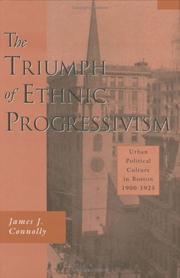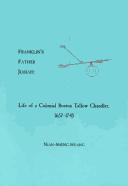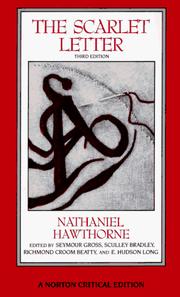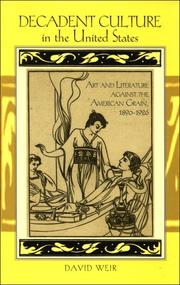| Listing 1 - 9 of 9 |
Sort by
|

ISBN: 0674029844 9780674029842 9780674909502 067490950X Year: 1998 Publisher: Cambridge, MA : Harvard University Press,
Abstract | Keywords | Export | Availability | Bookmark
 Loading...
Loading...Choose an application
- Reference Manager
- EndNote
- RefWorks (Direct export to RefWorks)
Progressivism, James Connolly shows us, was a language and style of political action available to a wide range of individuals and groups. A diverse array of political and civic figures used it to present themselves as leaders of a communal response to the growing power of illicit interests and to the problems of urban-industrial life. As structural reforms weakened a ward-based party system that helped mute ethnic conflict, this new formula for political mobilization grew more powerful. Its most effective variation in Boston was an "ethnic progressivism" that depicted the city's public life as a clash between its immigrant majority--"the people"--and a wealthy Brahmin elite--"the interests." As this portrayal took hold, Bostonians came to view their city as a community permanently beset by ethnic strife. In showing that the several reform visions that arose in Boston included not only the progressivism of the city's business leaders but also a series of ethnic progressivisms, Connolly offers a new approach to urban public life in the early twentieth century. He rejects the assumption that ethnic politics was machine politics and employs both institutional and rhetorical analysis to reconstruct the inner workings of neighborhood public life and the social narratives that bound the city together. The result is a deeply textured picture that differs sharply from the traditional view of machine-reform conflict.
Political culture --- Progressivism (United States politics) --- Culture --- Political science --- History --- Boston (Mass.) --- City of Boston (Mass.) --- Beantown (Mass.) --- بوسطن (Mass.) --- Būsṭun (Mass.) --- Бостон (Mass.) --- Горад Бостан (Mass.) --- Horad Bostan (Mass.) --- Бостан (Mass.) --- Bostan (Mass.) --- Бостън (Mass.) --- Bostŭn (Mass.) --- Βοστώνη (Mass.) --- Vostōnē (Mass.) --- Bostono (Mass.) --- بوستون (Mass.) --- Pô-sṳ-tun (Mass.) --- 보스턴 (Mass.) --- Bosŭt'ŏn (Mass.) --- Posŭt'ŏn (Mass.) --- Pokekona (Mass.) --- בוסטון (Mass.) --- Bostonia (Mass.) --- Bostona (Mass.) --- Bostonas (Mass.) --- ボストン (Mass.) --- באסטאן (Mass.) --- Bostons (Mass.) --- 波士顿 (Mass.) --- Boshidun (Mass.) --- Politics and government. --- Ethnic relations.
Book
ISBN: 9781107003989 1107003989 9780511782480 0511782489 1108696406 Year: 2019 Publisher: Cambridge : Cambridge University Press,
Abstract | Keywords | Export | Availability | Bookmark
 Loading...
Loading...Choose an application
- Reference Manager
- EndNote
- RefWorks (Direct export to RefWorks)
The Cambridge Edition of the Complete Fiction of Henry James provides, for the first time, a scholarly edition of a major writer whose work continues to be read, quoted, adapted and studied. The Bostonians is an extraordinary political and psychological drama narrating the struggle between Northern feminist Olive Chancellor and her cousin, former slaveholder and radical conservative Basil Ransom, for 'possession' of the beautiful, talented Verena Tarrant. The issues raised of the relations between the sexes, between North and South and between differing visions of 'progress' in America are as timely - and contentious - as when the novel first appeared. This fully annotated scholarly edition of one of James's most distinctive and important works features a detailed contextual introduction, full textual history and helpful explanatory annotation. It will be of interest to researchers, scholars and advanced students of Henry James, and of nineteenth- and twentieth-century British and American fiction and literature.
Manners and customs. --- James, Henry, --- Boston (Mass.) --- New York (N.Y.) --- New York (State) --- Massachusetts --- Social life and customs --- City of Boston (Mass.) --- Beantown (Mass.) --- بوسطن (Mass.) --- Būsṭun (Mass.) --- Бостон (Mass.) --- Горад Бостан (Mass.) --- Horad Bostan (Mass.) --- Бостан (Mass.) --- Bostan (Mass.) --- Бостън (Mass.) --- Bostŭn (Mass.) --- Βοστώνη (Mass.) --- Vostōnē (Mass.) --- Bostono (Mass.) --- بوستون (Mass.) --- Pô-sṳ-tun (Mass.) --- 보스턴 (Mass.) --- Bosŭt'ŏn (Mass.) --- Posŭt'ŏn (Mass.) --- Pokekona (Mass.) --- בוסטון (Mass.) --- Bostonia (Mass.) --- Bostona (Mass.) --- Bostonas (Mass.) --- ボストン (Mass.) --- באסטאן (Mass.) --- Bostons (Mass.) --- 波士顿 (Mass.) --- Boshidun (Mass.)

ISBN: 0871699036 Year: 2000 Publisher: London ; New York, NY ; Rheine : American Philosophical Society,
Abstract | Keywords | Export | Availability | Bookmark
 Loading...
Loading...Choose an application
- Reference Manager
- EndNote
- RefWorks (Direct export to RefWorks)
Candlemaking --- -Fathers --- -Soap trade --- -Cleaning compounds industry --- Dads --- Men --- Parents --- Househusbands --- Candle making --- Candles --- Wax craft --- History --- -History --- -Franklin, Benjamin --- -Franklin, Josiah --- Family --- Boston (Mass.) --- -Boston (Mass.) --- -Social life and customs --- -Candlemaking --- -Dads --- Franklin, B. --- Fathers --- Soap trade --- Cleaning compounds industry --- Franklin, Benjamin, --- Franklin, Josiah, --- Franklyn, Josiah, --- Family. --- City of Boston (Mass.) --- Beantown (Mass.) --- بوسطن (Mass.) --- Būsṭun (Mass.) --- Бостон (Mass.) --- Горад Бостан (Mass.) --- Horad Bostan (Mass.) --- Бостан (Mass.) --- Bostan (Mass.) --- Бостън (Mass.) --- Bostŭn (Mass.) --- Βοστώνη (Mass.) --- Vostōnē (Mass.) --- Bostono (Mass.) --- بوستون (Mass.) --- Pô-sṳ-tun (Mass.) --- 보스턴 (Mass.) --- Bosŭt'ŏn (Mass.) --- Posŭt'ŏn (Mass.) --- Pokekona (Mass.) --- בוסטון (Mass.) --- Bostonia (Mass.) --- Bostona (Mass.) --- Bostonas (Mass.) --- ボストン (Mass.) --- באסטאן (Mass.) --- Bostons (Mass.) --- 波士顿 (Mass.) --- Boshidun (Mass.) --- Social life and customs --- Franklin, Benjamin --- Boston, mass. (etats-unis) --- Franklin (benjamin), homme politique, memorialiste et physicien americain, 1706-1790 --- Histoire --- 18e siecle --- Biographie
Book
ISBN: 1299443281 0262314061 9780262314060 9780262314053 0262314053 0262018756 026231407X 9781299443280 9780262018753 9780262545860 Year: 2013 Publisher: Cambridge, Massachusetts
Abstract | Keywords | Export | Availability | Bookmark
 Loading...
Loading...Choose an application
- Reference Manager
- EndNote
- RefWorks (Direct export to RefWorks)
The evolution of the Boston metropolitan area, from country villages and streetcar suburbs to exurban sprawl and “smart growth.” Boston's metropolitan landscape has been two hundred years in the making. From its proto-suburban village centers of 1800 to its far-flung, automobile-centric exurbs of today, Boston has been a national pacesetter for suburbanization. In The Hub's Metropolis, James O'Connell charts the evolution of Boston's suburban development. The city of Boston is compact and consolidated—famously, “the Hub.” Greater Boston, however, stretches over 1,736 square miles and ranks as the world's sixth largest metropolitan area. Boston suburbs began to develop after 1820, when wealthy city dwellers built country estates that were just a short carriage ride away from their homes in the city. Then, as transportation became more efficient and affordable, the map of the suburbs expanded. The Metropolitan Park Commission's park-and-parkway system, developed in the 1890s, created a template for suburbanization that represents the country's first example of regional planning. O'Connell identifies nine layers of Boston's suburban development, each of which has left its imprint on the landscape: traditional villages; country retreats; railroad suburbs; streetcar suburbs (the first electric streetcar boulevard, Beacon Street in Brookline, was designed by Frederic Law Olmsted); parkway suburbs, which emphasized public greenspace but also encouraged commuting by automobile; mill towns, with housing for workers; upscale and middle-class suburbs accessible by outer-belt highways like Route 128; exurban, McMansion-dotted sprawl; and smart growth. Still a pacesetter, Greater Boston has pioneered antisprawl initiatives that encourage compact, mixed-use development in existing neighborhoods near railroad and transit stations. O'Connell reminds us that these nine layers of suburban infrastructure are still woven into the fabric of the metropolis. Each chapter suggests sites to visit, from Waltham country estates to Cambridge triple-deckers.
Cities and towns --- Growth. --- Boston Metropolitan Area (Mass.) --- Economic conditions. --- Global cities --- Municipalities --- Towns --- Urban areas --- Urban systems --- Human settlements --- Sociology, Urban --- Metropolitan areas --- Growth --- Boston (Mass.) --- E-books --- Conurbations --- MAs (Metropolitan areas) --- Metropolitan statistical areas --- City of Boston (Mass.) --- Beantown (Mass.) --- بوسطن (Mass.) --- Būsṭun (Mass.) --- Бостон (Mass.) --- Горад Бостан (Mass.) --- Horad Bostan (Mass.) --- Бостан (Mass.) --- Bostan (Mass.) --- Бостън (Mass.) --- Bostŭn (Mass.) --- Βοστώνη (Mass.) --- Vostōnē (Mass.) --- Bostono (Mass.) --- بوستون (Mass.) --- Pô-sṳ-tun (Mass.) --- 보스턴 (Mass.) --- Bosŭt'ŏn (Mass.) --- Posŭt'ŏn (Mass.) --- Pokekona (Mass.) --- בוסטון (Mass.) --- Bostonia (Mass.) --- Bostona (Mass.) --- Bostonas (Mass.) --- ボストン (Mass.) --- באסטאן (Mass.) --- Bostons (Mass.) --- 波士顿 (Mass.) --- Boshidun (Mass.) --- 711.432 --- 911.375.633 --- 711.432 Planologie: hoofdsteden; wereldsteden; metropolen --- Planologie: hoofdsteden; wereldsteden; metropolen --- Suburbs. Suburban areas --- City planning --- Villes --- Urbanisme --- Croissance --- Boston, Agglomération de (Mass.) --- Conditions économiques
Book
ISBN: 0674058550 9780674058552 9780674048416 0674048415 9780674416833 067441683X Year: 2021 Publisher: Cambridge, MA
Abstract | Keywords | Export | Availability | Bookmark
 Loading...
Loading...Choose an application
- Reference Manager
- EndNote
- RefWorks (Direct export to RefWorks)
In Eden on the Charles: The Making of Boston, Michael Rawson examines how the city's relationship with its natural surroundings informed its early growth and development. His compelling, well-researched narrative touches on several milestones on Boston's road to modernity, including the Common's conversion from a place of labor to a place of leisure, the emergence of pastoral suburbs as a respite from an increasingly urbanized landscape, and the long fight over a proposed municipal water system to bring fresh water to those who needed it most.Perhaps the book's most important lesson comes from a frustrated mariner who, upset over the maltreatment of the harbor, laments that "the past seems to be forgotten, the present only is regarded as of importance, and a veil is drawn over the future." Eden on the Charles is a valiant effort to combat such shortsightedness, reminding us that the key to building a successful community lies in respecting the natural resources that provide for it and in understanding our responsibility to our fellow citizens.
City planning --- Human ecology --- Ecology --- Environment, Human --- Human beings --- Human environment --- Ecological engineering --- Human geography --- Nature --- Cities and towns --- Civic planning --- Land use, Urban --- Model cities --- Redevelopment, Urban --- Slum clearance --- Town planning --- Urban design --- Urban development --- Urban planning --- Land use --- Planning --- Art, Municipal --- Civic improvement --- Regional planning --- Urban policy --- Urban renewal --- History --- Social aspects --- Effect of environment on --- Effect of human beings on --- Government policy --- Management --- Boston (Mass.) --- City of Boston (Mass.) --- Beantown (Mass.) --- بوسطن (Mass.) --- Būsṭun (Mass.) --- Бостон (Mass.) --- Горад Бостан (Mass.) --- Horad Bostan (Mass.) --- Бостан (Mass.) --- Bostan (Mass.) --- Бостън (Mass.) --- Bostŭn (Mass.) --- Βοστώνη (Mass.) --- Vostōnē (Mass.) --- Bostono (Mass.) --- بوستون (Mass.) --- Pô-sṳ-tun (Mass.) --- 보스턴 (Mass.) --- Bosŭt'ŏn (Mass.) --- Posŭt'ŏn (Mass.) --- Pokekona (Mass.) --- בוסטון (Mass.) --- Bostonia (Mass.) --- Bostona (Mass.) --- Bostonas (Mass.) --- ボストン (Mass.) --- באסטאן (Mass.) --- Bostons (Mass.) --- 波士顿 (Mass.) --- Boshidun (Mass.) --- Social conditions --- Environmental conditions.
Book
ISBN: 0674975243 0674061314 9780674061316 9780674053021 0674053028 Year: 2011 Publisher: Cambridge, Mass. Harvard University Press
Abstract | Keywords | Export | Availability | Bookmark
 Loading...
Loading...Choose an application
- Reference Manager
- EndNote
- RefWorks (Direct export to RefWorks)
In 2004 the Roman Catholic Archdiocese of Boston announced plans to close or merge more than eighty parish churches. Scores of Catholics-28,000, by the archdiocese's count-would be asked to leave their parishes. The closures came just two years after the first major revelations of clergy sexual abuse and its cover up. Wounds from this profound betrayal of trust had not healed.In the months that followed, distraught parishioners occupied several churches in opposition to the closure decrees. Why did these accidental activists resist the parish closures, and what do their actions and reactions tell us about modern American Catholicism? Drawing on extensive fieldwork and with careful attention to Boston's Catholic history, Seitz tells the stories of resisting Catholics in their own words, and illuminates how they were drawn to reconsider the past and its meanings. We hear them reflect on their parishes and the sacred objects and memories they hold, on the way their personal histories connect with the history of their neighborhood churches, and on the structures of authority in Catholicism.Resisters describe how they took their parishes and religious lives into their own hands, and how they struggled with everyday theological questions of respect and memory; with relationships among religion, community, place, and comfort; and with the meaning of the local church. No Closure is a story of local drama and pathos, but also a path of inquiry into broader questions of tradition and change as they shape Catholics' ability to make sense of their lives in a secular world.
Church closures --- Parishes --- Church polity --- Church closings --- Closing of churches --- Closings of churches --- Closure of churches --- Closures of churches --- Church management --- History --- History. --- Catholic Church. --- Boston (Archdiocese) --- Boston (Mass. : Archdiocese : Catholic Church) --- Boston (Mass.) --- City of Boston (Mass.) --- Beantown (Mass.) --- بوسطن (Mass.) --- Būsṭun (Mass.) --- Бостон (Mass.) --- Горад Бостан (Mass.) --- Horad Bostan (Mass.) --- Бостан (Mass.) --- Bostan (Mass.) --- Бостън (Mass.) --- Bostŭn (Mass.) --- Βοστώνη (Mass.) --- Vostōnē (Mass.) --- Bostono (Mass.) --- بوستون (Mass.) --- Pô-sṳ-tun (Mass.) --- 보스턴 (Mass.) --- Bosŭt'ŏn (Mass.) --- Posŭt'ŏn (Mass.) --- Pokekona (Mass.) --- בוסטון (Mass.) --- Bostonia (Mass.) --- Bostona (Mass.) --- Bostonas (Mass.) --- ボストン (Mass.) --- באסטאן (Mass.) --- Bostons (Mass.) --- 波士顿 (Mass.) --- Boshidun (Mass.) --- Church history. --- 282 <73> --- Katholieke Kerk. Rooms-katholieken--Verenigde Staten van Amerika. VSA. USA
Book
ISBN: 1479869988 1479816140 Year: 2016 Publisher: New York, NY : New York University Press,
Abstract | Keywords | Export | Availability | Bookmark
 Loading...
Loading...Choose an application
- Reference Manager
- EndNote
- RefWorks (Direct export to RefWorks)
Choice Outstanding Academic Title of 2016Reveals the lived experience of slaves in eighteenth-century Boston Instead of relying on the traditional dichotomy of slavery and freedom, Hardesty argues we should understand slavery in Boston as part of a continuum of unfreedom. In this context, African slavery existed alongside many other forms of oppression, including Native American slavery, indentured servitude, apprenticeship, and pauper apprenticeship. In this hierarchical and inherently unfree world, enslaved Bostonians were more concerned with their everyday treatment and honor than with emancipation, as they pushed for autonomy, protected their families and communities, and demanded a place in society.Drawing on exhaustive research in colonial legal records – including wills, court documents, and minutes of governmental bodies – as well as newspapers, church records, and other contemporaneous sources, Hardesty masterfully reconstructs an eighteenth-century Atlantic world of unfreedom that stretched from Europe to Africa to America. By reassessing the lives of enslaved Bostonians as part of a social order structured by ties of dependence, Hardesty not only demonstrates how African slaves were able to decode their new homeland and shape the terms of their enslavement, but also tells the story of how marginalized peoples engrained themselves in the very fabric of colonial American society.
Indentured servants --- Slaves --- Slavery --- Abolition of slavery --- Antislavery --- Enslavement --- Mui tsai --- Ownership of slaves --- Servitude --- Slave keeping --- Slave system --- Slaveholding --- Thralldom --- Crimes against humanity --- Serfdom --- Slaveholders --- Enslaved persons --- Persons --- Servants, Indentured --- Contract labor --- Slave labor --- History --- Boston (Mass.) --- City of Boston (Mass.) --- Beantown (Mass.) --- بوسطن (Mass.) --- Būsṭun (Mass.) --- Бостон (Mass.) --- Горад Бостан (Mass.) --- Horad Bostan (Mass.) --- Бостан (Mass.) --- Bostan (Mass.) --- Бостън (Mass.) --- Bostŭn (Mass.) --- Βοστώνη (Mass.) --- Vostōnē (Mass.) --- Bostono (Mass.) --- بوستون (Mass.) --- Pô-sṳ-tun (Mass.) --- 보스턴 (Mass.) --- Bosŭt'ŏn (Mass.) --- Posŭt'ŏn (Mass.) --- Pokekona (Mass.) --- בוסטון (Mass.) --- Bostonia (Mass.) --- Bostona (Mass.) --- Bostonas (Mass.) --- ボストン (Mass.) --- באסטאן (Mass.) --- Bostons (Mass.) --- 波士顿 (Mass.) --- Boshidun (Mass.) --- Social conditions

ISBN: 0393956539 Year: 1988 Publisher: New York : Norton,
Abstract | Keywords | Export | Availability | Bookmark
 Loading...
Loading...Choose an application
- Reference Manager
- EndNote
- RefWorks (Direct export to RefWorks)
Adultery --- Puritans --- Women --- Adultère --- Puritains --- Femmes --- Fiction --- Romans, nouvelles, etc. --- Romans --- Hawthorne, Nathaniel, --- Boston (Mass.) --- History --- Histoire --- Clergy --- Illegitimate children --- Married women --- Revenge --- Women immigrants --- #KVHA:American Studies --- Immigrant women --- Immigrants --- Vengeance --- Retribution --- Precisians --- Church polity --- Congregationalism --- Puritan movements --- Calvinism --- Married people --- Wives --- Bastard children --- Children of unmarried mothers --- Children --- Illegitimacy --- Unmarried mothers --- Clergy members --- Clergymen --- Indigenous clergy --- Major orders --- Members of the clergy --- Ministers (Clergy) --- Ministers of the gospel --- Native clergy --- Ordained clergy --- Ordained ministers --- Orders, Major --- Pastors --- Rectors --- Religious leaders --- Adulterous relationships --- Cheating, Marital --- Extra-marital sex --- Extramarital sex --- Infidelity, Marital --- Marital cheating --- Marital infidelity --- Marriage --- Sex crimes --- Paramours --- Hawthorne, Nathaniel --- -History --- -Adultery --- Triangles (Interpersonal relations) --- Adultère --- -City of Boston (Mass.) --- Beantown (Mass.) --- بوسطن (Mass.) --- Būsṭun (Mass.) --- Бостон (Mass.) --- Горад Бостан (Mass.) --- Horad Bostan (Mass.) --- Бостан (Mass.) --- Bostan (Mass.) --- Бостън (Mass.) --- Bostŭn (Mass.) --- Βοστώνη (Mass.) --- Vostōnē (Mass.) --- Bostono (Mass.) --- بوستون (Mass.) --- Pô-sṳ-tun (Mass.) --- 보스턴 (Mass.) --- Bosŭt'ŏn (Mass.) --- Posŭt'ŏn (Mass.) --- Pokekona (Mass.) --- בוסטון (Mass.) --- Bostonia (Mass.) --- Bostona (Mass.) --- Bostonas (Mass.) --- ボストン (Mass.) --- באסטאן (Mass.) --- Bostons (Mass.) --- 波士顿 (Mass.) --- Boshidun (Mass.) --- Fiction.

ISBN: 9780791472774 0791472779 Year: 2008 Publisher: Albany State university of New York press
Abstract | Keywords | Export | Availability | Bookmark
 Loading...
Loading...Choose an application
- Reference Manager
- EndNote
- RefWorks (Direct export to RefWorks)
American literature --- Art, American --- Decadence (Literary movement) --- Decadence in art --- Degeneration --- History and criticism. --- History. --- Social aspects --- United States --- Boston (Mass.) --- Chicago (Ill.) --- San Francisco (Calif.) --- Intellectual life --- Intellectual life. --- Decadence --- Eugenics --- Heredity, Human --- Sociology --- Vice --- Literary movements --- Literature, Modern --- American art --- Eight (Group of American artists) --- Indian Space (Group of artists) --- Mission School (Group of artists) --- NO!Art (Group of artists) --- Old Bohemians (Group of artists) --- Stieglitz Circle (Group of artists) --- History and criticism --- History --- Social aspects&delete& --- San Francisco County (Calif.) --- San Francisco --- San Francisco City & County (Calif.) --- San Francisco City and County (Calif.) --- City & County of San Francisco (Calif.) --- City and County of San Francisco (Calif.) --- Saint Francisco (Calif.) --- Yerba Buena (Calif.) --- Chikago (Ill.) --- Chikaho (Ill.) --- City of Chicago (Ill.) --- Shiḳago (Ill.) --- Čikago (Ill.) --- City of Boston (Mass.) --- Beantown (Mass.) --- بوسطن (Mass.) --- Būsṭun (Mass.) --- Бостон (Mass.) --- Горад Бостан (Mass.) --- Horad Bostan (Mass.) --- Бостан (Mass.) --- Bostan (Mass.) --- Бостън (Mass.) --- Bostŭn (Mass.) --- Βοστώνη (Mass.) --- Vostōnē (Mass.) --- Bostono (Mass.) --- بوستون (Mass.) --- Pô-sṳ-tun (Mass.) --- 보스턴 (Mass.) --- Bosŭt'ŏn (Mass.) --- Posŭt'ŏn (Mass.) --- Pokekona (Mass.) --- בוסטון (Mass.) --- Bostonia (Mass.) --- Bostona (Mass.) --- Bostonas (Mass.) --- ボストン (Mass.) --- באסטאן (Mass.) --- Bostons (Mass.) --- 波士顿 (Mass.) --- Boshidun (Mass.) --- شيكاغو (Ill.) --- Shīkāghū (Ill.) --- Çikaqo (Ill.) --- Чыкага (Ill.) --- Chykaha (Ill.) --- Чикаго (Ill.) --- Shikááʼgóó (Ill.) --- Σικάγο (Ill.) --- Sikago (Ill.) --- Kikako (Ill.) --- שיקגו (Ill.) --- Sicagum (Ill.) --- Chicagia (Ill.) --- Chiagum (Ill.) --- Čikāga (Ill.) --- シカゴ (Ill.) --- شکاگو (Ill.) --- Shikāgū (Ill.) --- Kyekago (Ill.) --- Tchicago (Ill.) --- שיקאגא (Ill.) --- Čėkaga (Ill.) --- 芝加哥 (Ill.) --- Zhijiage (Ill.)
| Listing 1 - 9 of 9 |
Sort by
|

 Search
Search Feedback
Feedback About UniCat
About UniCat  Help
Help News
News